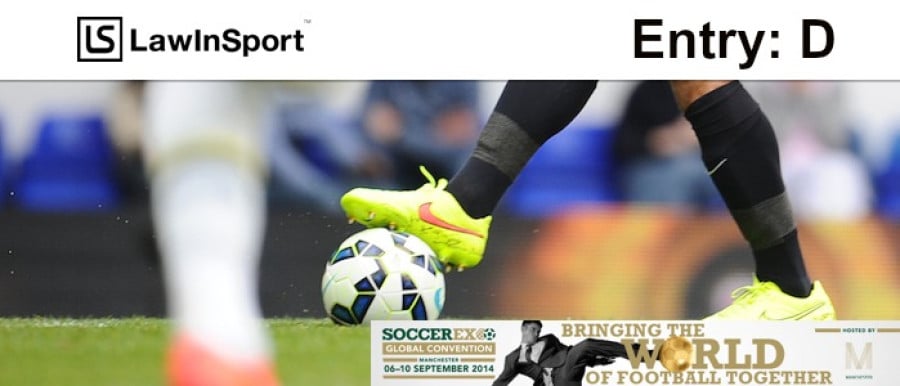Whom to sue before the Court of Arbitration for Sport (CAS)?

Two scenarios are particularly interesting:
-
Appeals against decisions, e.g. by the UEFA Appeals Body, which lead to an exclusion of a club from a competition (Scenario 1). If the club is suing before CAS to be reinstated into the competition, does it suffice to direct the appeal against UEFA? Or does the appellant also have to sue the (replacement) club which benefitted from the decision of UEFA? What are the legal implications of refraining to name one of the above respondents?
-
Appeals against decisions in so-called "inter-member disputes", e.g. contractual disputes between in-direct members of FIFA (clubs and players), in which FIFA's dispute resolution bodies act as a first decision making instance (Scenario 2). Before CAS, does the appellant also have to name FIFA as a respondent, i.e. the organization whose dispute resolution body took the allegedly wrong decision?
Standing
There are different reasons why the question of whom to sue in sports disputes is more difficult to deal with than in commercial proceedings. For one, you are dealing with a multi-tier dispute resolution system which includes internal dispute resolution bodies of associations (e.g. the FIFA DRC or the UEFA Appeals Body), which do not qualify as arbitral tribunals, and are thus open to challenge before state courts or true courts of arbitration.
Furthermore, because football is organized in national and international competitions, a decision taken in a football case often affects several third parties, not just the directly involved parties of a dispute.
Further, neither the regulations of FIFA and UEFA nor the CAS Code contain any specific rules, e.g. concerning the issue of standing to be sued and/or mandatory litis consortium. As a result, CAS Panels regularly turn to Swiss Law to answer the question of whom to sue before CAS.2
Under Swiss law, a party has standing to be sued, for instance, if it is personally concerned with (“obliged by”) the disputed right which is at stake. In other words, a party has standing to be sued and a claim may be brought against it “only if it has some stake in the dispute because something is sought against it.”3
However, in appeal proceedings against decisions taken by FIFA and UEFA bodies, the general definition of standing to be sued also has to be construed in the context of mandatory Swiss association law, namely Article 75 of the Swiss Civil Code (SCC), which reads:
“Any member who has not consented to a resolution which infringes the law or the articles of association is entitled by law to challenge such resolution in court within one month from the day on which he became cognizant of such resolution."
The purpose of Article 75 SCC is to protect a member of an association from unlawful infringements by the association. The provision is interpreted in a broad sense and encompasses any decision of the association, irrespective of its nature, be it e.g. disciplinary or administrative. Most importantly, the party having standing to be sued in matters covered by Article 75 SCC is in general only the association which issued the appealed decision.4
Appeals with a potential influence on rights of third parties
In the third qualifying round of the 2014/15 UEFA Champions League, Legia Warsaw beat Celtic Glasgow 6-1 on aggregate. However, on 8 August 2014 Celtic Glasgow were reinstated into the competition after the UEFA Control and Disciplinary Body (UEFA CDB) declared the second leg between the two teams forfeit (3-0) in favour of Celtic, because Legia had fielded an ineligible player. In awarding the second leg to Celtic, the UEFA CDB levelled the aggregate score at 4-4, resulting in Celtic progressing on away goals.Legia challenged the decision before the UEFA Appeals Body and ultimately before CAS, directing its appeal against UEFA and Celtic.
It is obvious that the appeal must be directed against UEFA as respondent because UEFA sanctioned Legia on the basis of its own disciplinary regulations, affecting Legia in its membership rights. Not as obvious is the role of Celtic in the dispute. At first sight, Legia does not have a legal claim against Celtic, so why should Legia direct its appeal also against the club which (indirectly) benefitted from UEFA's decision?
In a similar scenario, Fenerbahce Istanbul was recently excluded by UEFA from the UEFA Champions League and replaced by Trabzonspor. Fenerbahce directed its request for provisional measures before the CAS only against UEFA as respondent, which led the CAS to conclude the following:
To continue reading or watching login or register here
Already a member? Sign in
Get access to all of the expert analysis and commentary at LawInSport including articles, webinars, conference videos and podcast transcripts. Find out more here.
- Tags: Court of Arbitration for Sport (CAS) | FIFA | Football | Soccerex | UEFA
Related Articles
- Protecting English football’s heritage: Hull City v Hull Tigers - Entry A
- Refusal to delivery the ITC in international transfers of football players and free movement of workers within the EU - Entry B
- FIFA’s new Regulations on Working with Intermediaries explained
- Planning the breakup: the relationship between clubs and managers
- LawInSport at Soccerex Global Convention 2014
Written by
Christian Keidel
Christian Keidel is a partner Partner at Lentze Stopperhas. He been focusing his area of expertise for more than 12 years on dispute resolution in sport and the advice of international sport associations. He has represented successfully stakeholders in sports in numerous cases in front of the dispute resolution bodies of UEFA and FIFA as well as the Court of Arbitration for Sport (CAS) and state courts. He is also a long-time advisor to international sports associations with respect to regulations, good governance and the commercialisation of rights.
Alexander Engelhard
Alexander Engelhard is a dispute resolution and commercial lawyer advocating before state courts and arbitral tribunals, especially in the sport, media and entertainment industry. He also acts as arbitrator and mediator. In addition, he advises clients on the drafting of contracts, rules and regulations.
He is a member of various arbitration and sports law-related organisations. He is also a lecturer at the University of Frankfurt for German and international arbitration, as well as on dispute resolution in national and international sport.
JUVE Handbook 2018/2019: highly recommended lawyer for dispute resolution.


 Global Summit 2024
Global Summit 2024